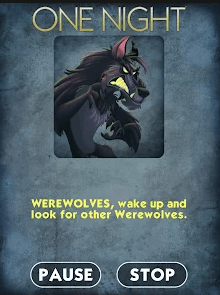One- night Werewolf

Game info:
One-night was designed by Ted Alspach and Akihisa Okui. I played two rounds with a group of friends who had never played before, all of us using the phone app. This is a social deduction game, like the versions of Mafia we explored in class, where people go to sleep at night and wake up to find out what happened to their village in the night. Each player is assigned a role through the app, and can conveniently be played anywhere (like in a park where I forced my friends to play) since people always have their phones on them. It can even be played remotely, but I don’t think this version of the game would be very fun as you don’t get to watch the werewolf squirm. The
Comparison to similar games:
One-night differs from most variations of these games, as you only have one cycle to determine who one of the werewolfs is, making it easy to play quickly (and convince people to play with you as it’s only one round and not very involved). Rather than having one mafia left standing to win the game, only a single werewolf need-be identified in order to win the game. Despite everyone in my group being a beginner, the game was very easy to pick up on, and not only for people with experience playing similar games. There is also no need to have a narrator, as the app takes care of this narrating aloud, so no one has to be left out of the fun (although some people do get a kick out of coming up with creative narrations in games like Mafia). The app also has a timer to ensure a timely deliberation period.
Funny failures:
The first round went pretty poorly, as people were not yet used to the strategy involved with each role. People were not very invested in the game and seemed to choose randomly, and a werewolf was identified, but this was not a demonstration of skill. The discussions in the second round were much more interesting, as people knew the roles and got into it a bit more. Still, the noviceness showed through, and the “seer” someone who is able to check someone else’s status, correctly found out the werewolf. They were not very convincing in attempting to get the villagers to vote this person out, and their attempts to get one person out made them seem very wolfy. They ended up being voted out.
Exploration of dynamics:
The mechanics of the game are simple once everyone understands their roles (they are very similar to Mafia and don’t require much explanation here). The dynamics of the game become interesting during the deduction phase. In reference to the failure mentioned above, a wolf would also likely want to target a single villager to protect all of their wolf friends. The mechanics, therefore, lead to tension between the roles of a villager with extra information, and a wolf with information about their brethren, in dynamic analysis. The seer who correctly identifies a wolf is less useful/ all-powerful than it may seem without having played the game. The game offers a balance of informational opportunities for villagers/wolfs so that no one group is at an inherent advantage during gameplay.
Types of fun:
This game includes narrative, challenge, and expression elements. The challenge and narrative aspects of this game are clear, although the story aspect is repetitive for the mobile app. The most fun, in my opinion, comes with expression. The game is entirely different depending on the personnel involved, as everyone brings their unique expression of deception or attempts at truth-telling to the deliberation process. As there is only one round to this game, there is little chance to build camaraderie among players of the same team, but there is still an element of bringing friends together and connecting, especially learning their unexpected skills of deception.
Potential improvements:
This game had a repetitive narrative and could include different modes depending on the tastes of the players. I think you could also include a house rule to play multiple rounds of this game where each player tallies up a score of how many times they won the game if people wanted to play for longer and really learn who the queen/king of deception is. Once you reach a certain number, this person is the overall winner!



